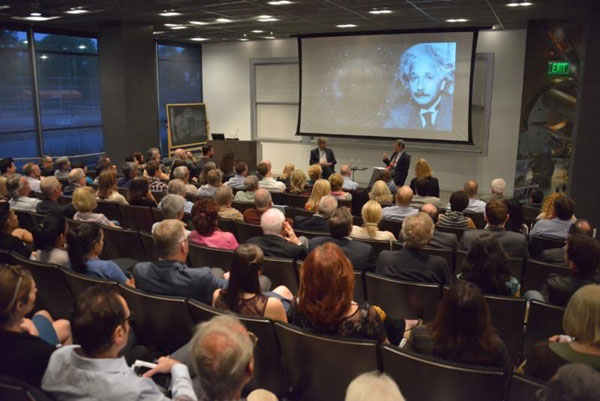 In discussion with Dr. Reitze at CalTech
In discussion with Dr. Reitze at CalTechThe discovery of gravitational waves earlier this year - something predicted a century ago in theory by Albert Einstein - may usher in an entirely new type of physics that could completely change the way we understand the universe, said Dr David Reitze at Caltech. It may also allow us to find ways to listen in to the echoes of the very foundation of the universe in the immediate aftermath of the Big Bang. Reitze is the chief scientist in charge of the search for gravitational waves, a 25 year-project jointly managed by Caltech and MIT that involved some 1,000 scientists working in the US and around the world. He talked to the Los Angeles World Affairs Council on Wednesday April 21st about the thrill he and his colleagues felt when they first heard the "beeps that went around the world".
Gravitational waves, according to Einstein's theory, are ripples in space-time that are projected across the universe at the speed of light from some cataclysmic event - in this case, Reitze says, it was the collision of two black holes some 1.3 billion light years away that sent out the waves. They were picked up by two extremely sensitive 2.5 mile-long L-shaped sensors in Washington State and Louisiana, which are known as the LIGO, or Laser Interferometer Gravitational-Wave Observatory.
"I was stunned," said Reitze. "This event hit our detectors at like 2:15am, so we were all asleep." When he woke up and read his emails and looked at the electronic log book of the LIGO detectors, "immediately I said to myself, we might have something here." Amazingly the LIGO sensors had only just been turned on, and nobody was expecting to get a hit so quickly. But after some detailed online analysis that compared data from both the sensors which are at opposite ends of the country, they decided that the event was genuine, and resulted from the collision of two black holes with a combined mass equivalent to 62 of our suns.
According to the theory of general relativity, black holes are formed when large stars burn out and implode under the force of their own gravity, becoming so dense that nothing can escape them, not even light. Their gravity will continue to suck in any matter that is nearby - today physicists think that most galaxies have enormous black holes at their center. "A black hole is like a vampire," said Reitze. However in his day Einstein himself did not like the ideas of black holes, and also flip-flopped on the idea of gravitational waves, even though his theories seemed to predict their existence. "Einstein had a love/hate relationship with gravitational waves, said Reitze. "I think he would have been absolutely amazed if he were alive to see this."
One of the remarkable things about the LIGO detection of gravitational waves is the fact that they came from black holes, which are otherwise very hard to observe, since they emit no light or most other forms of radiation. "There are many amazing things about this discovery," said Reitze. "One is, this is the first direct observation of not just one black hole, but two black holes. It's the first observation of the end stage life of two black holes that combined and merged into a single black hole."
After this first discovery, Reitze says that scientists now want to use gravitational waves to learn a lot more about black holes: "I think what we do want to learn and what we can learn is how black holes form, how many of them there are in the universe, what masses they are." Of course what they would most like to know is what happens inside black holes, but unfortunately nothing that goes into a black hole can escape again, making the gathering of information a daunting task.
Furthermore, Reitze says that interferometers of different sizes and specifications could conceivably pick up gravitational waves that were produced by the Big Bang that created the universe. There are new interferometers being built in Europe, India and Japan (the Japanese version is being buried underground to reduce human-generated vibrations from vehicles and other machines). And the European Space Agency is also working on a plan to create an enormous interferometer that would be stationed in space, which could be many times more sensitive again than anything that could be built on earth. "I wouldn't be surprised if we learn see that fundamentally changes the way we see the universe," said Reitze.
He even speculated that this new type of "gravitational wave physics" might usher in a paradigm shift akin to the shift in understanding brought in by Einstein's general theory of relativity, which basically dismantled the 200-year old body of Newtonian physics. "Every time we make an instrument that looks at the universe in a new way - a telescope, a microscope, a laser, you learn things that you didn't anticipate." One of these things might be that Einstein's theories need to be updated. The universe, it seems, contains an inexhaustible supply of wonders - if only you know how to look for them.

